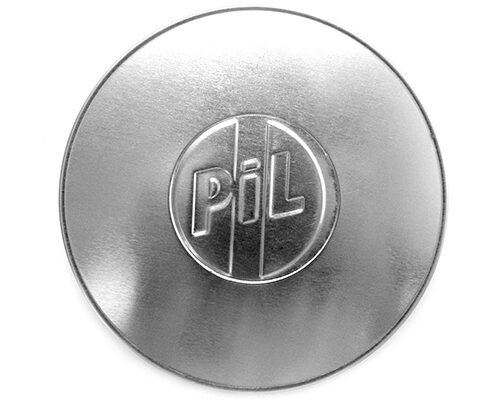It is the fortieth anniversary of the Clash’s album London Calling; it is also – this week – the fortieth anniversary of Public Image Ltd’s second album, Metal Box. One critic (Chris Harvey in the Independent) compared the two albums, calling the opening track of PiL’s album, ‘Albatross’, “near-unlistenable”. Another critic (and novelist and scriptwriter), David Quantick, added drily on social media that ‘Albatross’ stood up pretty well against “’Jimmy fucking Jazz’”, and anyone who remembered the pitiful Clash song would have conceded that he had a point.
The thing is, Metal Box was meant to be near-unlistenable, or at least to go very much against the grain of what people were expected to listen to. Not that this was a huge surprise for people who had been listening to John Lydon’s new band. After a year – at the time, it seemed like much longer – since he left the Sex Pistols, Lydon came back with a new band, and a nearly-eponymous single that seemed to show that lightning could strike twice in the same place, and that an individual could remake the musical landscape not just once, but twice.
The album that followed, First Issue, made people think again. It certainly had its moments (‘Annalisa’), and its atmosphere, but it was wilfully slapdash. (“We only wanted to finish this album with the minimum amount of effort, which we are doing very successfulleee,” Lydon informs us at one point on – excuse me? That title? – ‘Fodderstompf’.) PiL, it was clear, was in opposition not only to every other band around at the time, but to themselves; and, specifically, Lydon’s own past. To listen to this as someone who had come to full musical consciousness because of Never Mind The Bollocks (as I had) was akin to growing beyond adolescence.
First Issue was a jab in the ribs to fans of the Pistols; even those who were fully seduced by the first single found it something of a challenge to endure, and endorse. But that, we thought, with some reason, was the point. Metal Box took this process of alienation and auto-iconoclasm to a new level, or doubled down on it; but this time, it worked.
Readers of this site do not perhaps need to be reminded that 1979 was a glorious year for a certain kind of music. The top 40 certainly had more innovation and stylistic variance in it than any year since… well, since 1978, and that was a pretty good year too. Wire’s 154, XTC’s Drums And Wires, The Fall’s Live At The Witch Trials, The Pop Group’s Y, Talking Heads’ Fear Of Music, Joy Division’s Unknown Pleasures – all these, and many others, were pointing to new vistas in the sonic landscape (although Drums And Wires could be said to be a retrogression from the band’s first two albums, but hey). Yet people still looked to John Lydon as a saviour: we missed the days when the nation was united under the banner of the Pistols, and his obvious and fearsome intelligence, as well as his obvious and fearsome integrity, made him a lightning-rod for a certain kind of music fan – that is, the kind who read the NME, listened to John Peel, and knew where The Fall got their name from. PiL may not have been either the first or the only band to try to deconstruct rock but Lydon was very much the King over the water, hoped to return from exile to lead us down the true path.
This never works, as Lydon himself was at pains to say at the time, and has continued to say ever since, but, as a certain film that also came out in 1979 took great pains to tell us, there are times when the more someone tries to explain that he is not the Messiah, the more this is taken as proof of that person’s sincerity and qualifications to be the Messiah. This, really, was what it was like back then.
Metal Box’s challenging attitude to its audience was apparent before you even listened to a note. First, you had to get the damn records out of the 12" circular canister they were packed in. Then you had to decide what order you were going to play them in. There were three 12" records, each with one or two songs on them, and, to be fair to the critic mentioned above, it’s a fair bet to say that ‘Albatross’ was not everyone’s favourite track, and it didn’t get listened to as frequently as the others. But this time, as opposed to the low-jinks of First Issue, there was a cohesion to the album as a whole: it had its sound-world, with its own rules, and played by them. Remarkably, given that Lydon’s presence was by some distance the most important thing about the band, three of its tracks are instrumentals (and not bad ones at that). There’s a focus and attack to the music: nothing in it feels out of place, or as though it belongs on another album. (And, thanks to its packaging, you had to ask yourself if you could even call it an album.)
It’s an odd business, listening to it again after forty years. (Forty years, it is generally accepted, is the conventional temporal unit of nostalgic reflection.) The fact that it is so anti-nostalgic in itself (“this person’s had enough of useless memories”, etc.) means that it hasn’t accrued any cultural dust; no one will ever use any of its songs in an advert, and if anyone’s ever chosen one of its songs on Desert Island Discs then I have not been told about it.
And yet… Lydon is responsible for, or implicated in, three of the most surreally memorable moments in pop TV. The first, of course, was the Sex Pistols’ appearance on the Bill Grundy show in 1976. The second was as a panellist on the show Juke Box Jury, in which guests would hear new releases and determine, using their experience and judgement, whether the record would be a hit or not. Lydon, whose fellow guests were musical singer Elaine Page, DJ Alan “Fluff” Freeman, and author and socialite Joan Collins (and under the chairmanship of Noel Edmonds – you really could not make this stuff up), gives a performance of exquisite insolence, even though he’s the only one wearing a bow tie. (I promise you it is half an hour of your time well spent.)
The third is PiL’s 1980 appearance on the hugely popular show, American Bandstand. Host Dick Clark looks very much out of his depth while PiL not only firmly refuse to lip-synch or pretend to play along with two songs from Metal Box – ‘Poptones’ and ‘Careering’d – but Lydon walks into the audience, and gets everyone in it – everyone – dancing along. The first song is about a young woman who was abducted and sexually assaulted in a wood; the second is about the Northern Ireland “Troubles”. But look at the clip: it’s like something of a cross between Saturday Night Fever and ‘All You Need Is Love’. These are songs about rape and political murder; but for a few minutes, Lydon, infectiously charming, the urchin who has got something good for Christmas, gets everyone bopping along to them. At the end of the day, there’s always a good dance.



